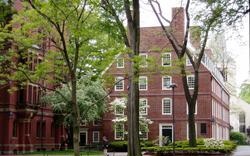
A student listens as a member of the committee in charge of Harvard's re-accreditation explains the committee's objectives. The committee met with students yesterday afternoon in Ticknor Lounge, Boylston Hall to talk about academics and quality of life at Harvard.
Only five students showed up yesterday to voice their thoughts on life at Harvard at a meeting with the New England Association of Schools and Colleges reaccreditation committee, a group of officials from peer institutions conducting a holistic evaluation of the University.
While it is unlikely that the committee, led by Georgetown President John J. DeGioia, would deny Harvard reaccreditation, the process allows students to voice criticism and praise of the University. Philipp W. Grimm ’11, one of the four undergraduates—the fifth student was in graduate school—who attended the meeting, suggested that the low turnout was indicative of the Harvard administration’s inability to communicate successfully with the student body.
“The administration needs to rethink how it interacts with students,” Grimm said. “The dean sent out an e-mail to the student population, and only four of us showed up on our own free will.”
While attendees said they were not particularly upset by the elimination of hot breakfast on weekdays in the Houses—one of the more widely discussed budget cuts among students this year—they did express disappointment at the way the College administration handled budget cuts in the spring.
They criticized College officials for announcing the cuts during the May reading period and for notifying students of town hall meetings to discuss the cuts only minutes before they were scheduled to take place.
Other than their critique of the administration’s communication with students, however, the undergraduates who attended the reaccreditation meeting generally voiced positive feedback about life at Harvard.
The group unanimously supported the College’s House system and praised Harvard’s network of proctors, resident tutors, and peer advising fellows.
They also lauded the new General Education program, citing the new requirements’ simplicity and the improvement in the quality and relevancy of the courses.
“The things that people complain about seem very petty in perspective to the things that people complain about at other schools,” said Spencer B.L. Lenfield ’12 at the meeting.
Reaccreditation is a voluntary process that allows universities and colleges to show the public that they meet a variety of standards in areas ranging from academic programs to financial resources.
Many jobs and professional schools require applicants to have degrees from accredited institutions.
As part of the reaccreditation process, Harvard prepared a 141-page “self-study report” detailing the University’s structure, institutional history, recent changes, and current challenges.
The University was last reaccredited in 1997.
“I don’t think anyone in the process expects us to come back and say that Harvard shouldn’t be an accredited college,” said Yale Deputy Provost and committee member Charles H. Long. “We try to make it a constructive report rather than a report intended to find out huge gaps and places where the University has fallen apart.”
While no Undergraduate Council members attended the event, UC President Andrea R. Flores ’10 said that the Council provided student perspectives for Harvard’s reaccreditation report and sent officers to the reaccreditation committee’s opening dinner on Sunday.
The committee will remain on campus until Wednesday.
—Staff writer Lauren D. Kiel can be reached at lkiel@fas.harvard.edu.
—Staff writer Eric P. Newcomer can be reached at newcomer@fas.harvard.edu.
Read more in News
UC Embarks on HoCo OutreachRecommended Articles
-
REPORTERS SOUND ELI IDEAS ON HARVARD SHORTCOMINGSArmed with copy pads, pencils, and a single question, Crimson reporters have been combing the University graduate schools during the
-
 Harvard's Getting Some 'Cred
Harvard's Getting Some 'Cred -
Breaking the MoldAs admissions get more selective, the market for those looking to increase their chance of admission gets more and more pricey.
-
Government Professors Caution Against Political Science Spending CutsA Congressional budgetary amendment severely limiting National Science Foundation funding for political science research poses a significant threat to that field’s most promising academic work, Harvard government professors warned Monday.
-
 Confronting The Sequester
Confronting The Sequester -
 Amidst Celebrations, Faust Warns of Grave Repercussions of Sequestration
Amidst Celebrations, Faust Warns of Grave Repercussions of Sequestration













